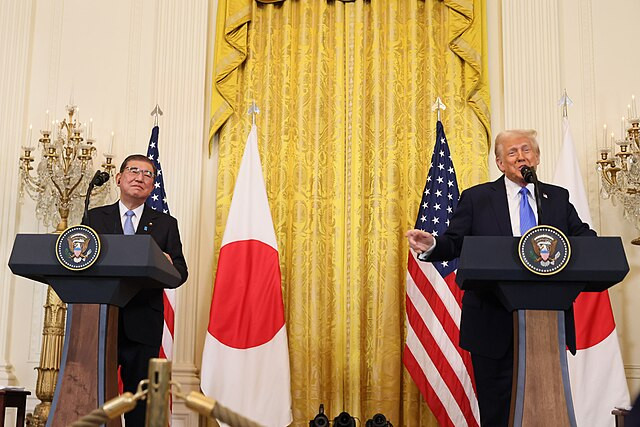Japan's top trade negotiator abruptly canceled a planned trip to Washington on Thursday, underscoring the difficulties in finalizing a $550 billion investment package tied to reduced U.S. tariffs on Japanese imports.
Chief Cabinet Secretary Yoshimasa Hayashi told reporters that negotiator Ryosei Akazawa's visit was called off after "it became apparent that certain points required further technical discussion." Talks will continue at the administrative level, Hayashi said, though he pressed Washington to swiftly amend its presidential order on reciprocal tariffs.
Tokyo has demanded written confirmation that U.S. tariffs on Japanese automobiles and parts will be lowered to 15% from as high as 27.5%, and that so-called "stacking" duties on goods like beef will not exceed the 15% ceiling. "We are strongly requesting that measures be taken to amend the presidential order concerning mutual tariffs as soon as possible, and to issue a presidential order to reduce tariffs on auto parts," Hayashi said.
The delay comes weeks after the two countries announced a July agreement cutting tariffs on Japanese exports in exchange for Tokyo's pledge to channel $550 billion into U.S.-bound investment, through loans and guarantees. The package has become politically charged after President Donald Trump described it as "our money to invest, as we like," while Japanese officials stressed that returns would be shared proportionally.
U.S. Commerce Secretary Howard Lutnick said earlier this week that an announcement on the investment plan was imminent, but the latest snag highlights how unresolved issues continue to stall progress. A government source told Reuters that Akazawa could still travel to Washington as early as next week if differences are narrowed.
Japanese negotiators have insisted that tariff amendments be finalized before committing to a joint document on the investment package. Akazawa said in July that the U.S. had promised to include a "no-stacking" arrangement similar to that extended to the European Union. "We have confirmed with the United States that a sincere and prompt implementation of the Japan-U.S. agreement is vital," he said.
The uncertainty is already weighing on Japan's economy. Bank of Japan board member Junko Nakagawa warned Thursday that exports and industrial production face a "reactionary decline" as companies front-load shipments to avoid higher tariffs. Corporate profits, particularly in manufacturing, are projected to fall, reflecting weaker export profitability and a slowdown in global demand.
Japan's exports to the U.S. fell sharply in July, marking the steepest monthly drop in four years. The government has cut its annual growth outlook from 1.2% to 0.7%, citing the drag from tariffs.
Despite the turbulence, Japanese officials maintain the agreement has value if fully implemented. "Some people are saying Japan is simply handing over $550 billion," Akazawa said in July. "But such claims are completely off the mark."






